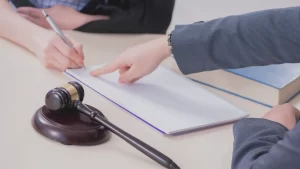
Depositions are an important part of any legal case. Knowing whether your deposition went well can be difficult, but there are some telltale signs that it was a success. In this blog post, we will explore the various ways you can tell that you did well, as well as some things to remember before your deposition.
What Is a Deposition?
A deposition is a question-and-answer session conducted during the discovery phase of a personal injury case. A deposition is taken under oath. It gives attorneys on both sides of the case the opportunity to ask questions of witnesses directly, including the injured party and any other individuals with relevant information. During a deposition, you must answer questions under oath and provide testimony that can be used in court proceedings. The purpose is to collect information and testimony about the accident, the injuries sustained, and any other relevant case details. A court reporter will transcribe the deposition and might videotape it for later use in a trial.
Did You Answer All Questions Truthfully?
When testifying in a deposition, the most important thing is to answer all questions truthfully and accurately. It is crucial to be honest when being questioned. If you are not honest, your testimony could be used as evidence against you if it is proven that you lied. Pause before responding to any question, and refrain from providing any unnecessary information. You must remain consistent throughout your deposition, so ensure that your answers are truthful and accurate. If you answered all questions truthfully and honestly, your deposition probably went just fine.
Did You Know the Facts of the Accident?
When you testify in a deposition, knowing the facts of the accident you are testifying about is crucial. This means knowing what happened and the dates, times, and details related to the event. If you answered all questions accurately about the accident and its circumstances, you were well prepared for your deposition. Reviewing any documents related to the incident to ensure you can confidently recall the details of the accident can be helpful.
Did You Speculate?
You might be asked questions you don’t know how to answer in the deposition. If you’re presented with a question with an answer you either don’t know or only think you might know, think before you answer. If you aren’t certain about the answer, it’s okay to say you don’t know. Don’t speculate. If your answer turns out to be inaccurate, it could be construed as lying and damage your credibility. If you didn’t speculate, your deposition probably went well.
Did You Remain Calm and Respectful Throughout the Process?
Remaining calm and respectful during your deposition is paramount. This is especially true if the opposing party has aggressive attorneys or an overly confrontational defendant. Staying calm during your deposition can make a difference in the outcome of your case. Make sure you answer the questions truthfully and do not become defensive or overly emotional. Try to remain courteous, even if the questioning becomes difficult. Overall, if you could stay polite and respectful, you did fine
What Happens After a Deposition
After a deposition, there are a few steps to follow before the case can move forward. Both parties will receive the transcripts. Afterwards, your attorney will likely continue to collect evidence, investigate the accident, and speak with witnesses to build a strong case on your behalf. If a settlement can’t be reached, the trial will proceed.
How a Personal Injury Attorney Can Help
 Having an Indianapolis personal injury attorney on your side during a deposition can be invaluable. Your lawyer will ensure your rights are protected and you are treated fairly. During the deposition, your attorney can object to certain questions that may be irrelevant or overly intrusive. Afterwards, your lawyer can review the transcript to ensure your answers are accurately documented. In addition, they can also help you understand what to expect in the aftermath of the deposition and advise you on how to best prepare for trial.
Having an Indianapolis personal injury attorney on your side during a deposition can be invaluable. Your lawyer will ensure your rights are protected and you are treated fairly. During the deposition, your attorney can object to certain questions that may be irrelevant or overly intrusive. Afterwards, your lawyer can review the transcript to ensure your answers are accurately documented. In addition, they can also help you understand what to expect in the aftermath of the deposition and advise you on how to best prepare for trial.
Speak with an Indiana Personal Injury Lawyer
You should have an experienced Indiana personal injury lawyer when preparing for and attending a deposition. An attorney can help you understand what to expect, ensure the deposition goes smoothly, and protect your rights. Contact Hankey Marks & Crider today at (317) 634-8565 for a free consultation to discuss your case and the benefits of working with a lawyer.
Related posts
When Will I Get the Settlement for My Accident Claim?


